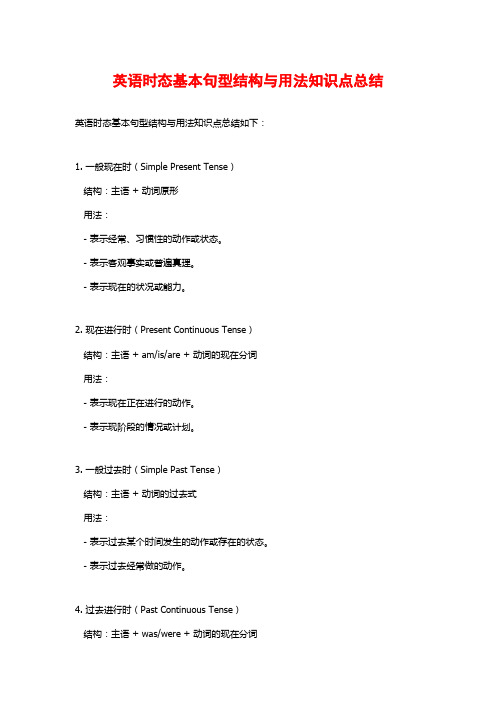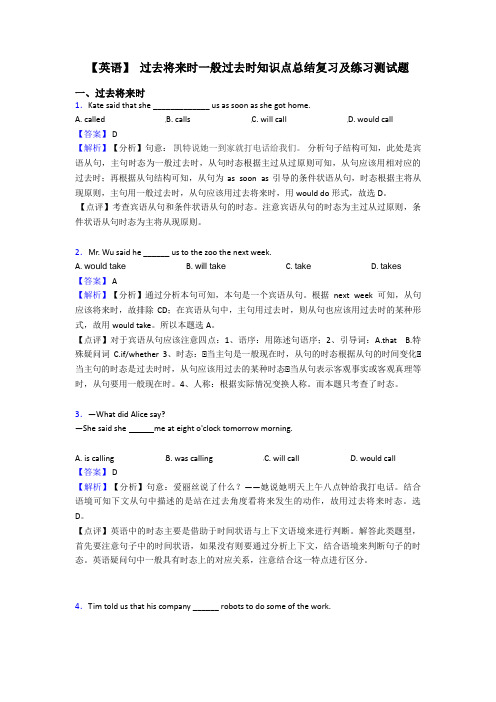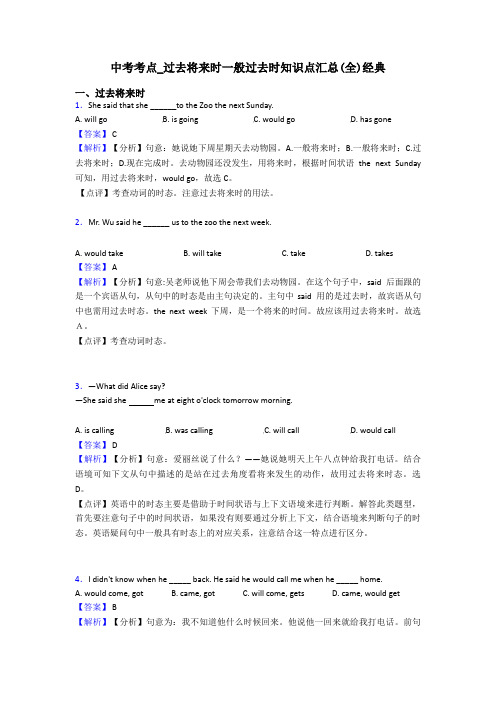一般将来时与过去将来时知识点总结
【英语】过去将来时一般过去时知识点总结(2)

【英语】过去将来时一般过去时知识点总结(2)一、过去将来时1.When we were boys we swimming every summer.A. goB. would goC. wentD. goes【答案】B【解析】【分析】句意:小时候,每到夏天我们都要去游泳。
When引导时间状语从句,从句用一般过去时,主句用过去将来时,would+动词原形,表示过去习惯性的动作。
故选B。
【点评】考查would+动词原形表习惯性动作。
2.—What did your son say in the letter?—He told me that he __________ the Great Wall the next day.A. will visitB. has visitedC. is going to visitD. would visit【答案】 D【解析】【分析】句意:你的儿子在信中说什么?他告诉我他第二天要去参观长城.结合语境可知从句描述的是站在过去角度看将来发生的动作,故用过去将来时态,故选D.【点评】英语中的时态主要是借助于时间状语与上下文语境来进行判断。
解答此类题型,首先要注意句子中的时间状语,如果没有则要通过分析上下文,结合语境来判断句子的时态。
英语疑问句中一般具有时态上的对应关系,注意结合这一特点进行区分。
3.Mr. Wu said he ______ us to the zoo the next week.A. would takeB. will takeC. takeD. takes【答案】 A【解析】【分析】句意:吴老师说他下周会带我们去动物园。
在这个句子中,said 后面跟的是一个宾语从句,从句中的时态是由主句决定的。
主句中said 用的是过去时,故宾语从句中也需用过去时态。
the next week 下周,是一个将来的时间。
故应该用过去将来时。
故选A。
【点评】考查动词时态。
英语时态基本句型结构与用法知识点总结

英语时态基本句型结构与用法知识点总结英语时态基本句型结构与用法知识点总结如下:1. 一般现在时(Simple Present Tense)结构:主语 + 动词原形用法:- 表示经常、习惯性的动作或状态。
- 表示客观事实或普遍真理。
- 表示现在的状况或能力。
2. 现在进行时(Present Continuous Tense)结构:主语 + am/is/are + 动词的现在分词用法:- 表示现在正在进行的动作。
- 表示现阶段的情况或计划。
3. 一般过去时(Simple Past Tense)结构:主语 + 动词的过去式用法:- 表示过去某个时间发生的动作或存在的状态。
- 表示过去经常做的动作。
4. 过去进行时(Past Continuous Tense)结构:主语 + was/were + 动词的现在分词用法:- 表示过去某个时间段内正在进行的动作。
5. 一般将来时(Simple Future Tense)结构:主语 + will/shall + 动词原形用法:- 表示将来某个时间或情况下会发生的动作。
6. 将来进行时(Future Continuous Tense)结构:主语 + will/shall be + 动词的现在分词用法:- 表示将来某个时间段内正在进行的动作。
7. 过去将来时(Future-in-the-Past Tense)结构:主语 + would/should + 动词原形用法:- 表示过去某个时间点的未来动作或情况。
8. 完成时态(Perfect Tenses)结构:have/has/had + 动词过去分词用法:- 表示过去某个时间点之前已经完成的动作。
- 表示过去某个时间点之前已经发生的或持续到现在的状态。
9. 过去完成进行时(Past Perfect Continuous Tense)结构:had + been + 动词的现在分词用法:- 表示过去某个时间点之前一直在进行的动作。
【英语】 过去将来时一般过去时知识点总结复习及练习测试题

【英语】过去将来时一般过去时知识点总结复习及练习测试题一、过去将来时1.Kate said that she _____________ us as soon as she got home.A. calledB. callsC. will callD. would call【答案】 D【解析】【分析】句意:凯特说她一到家就打电话给我们。
分析句子结构可知,此处是宾语从句,主句时态为一般过去时,从句时态根据主过从过原则可知,从句应该用相对应的过去时;再根据从句结构可知,从句为as soon as引导的条件状语从句,时态根据主将从现原则,主句用一般过去时,从句应该用过去将来时,用would do形式,故选D。
【点评】考查宾语从句和条件状语从句的时态。
注意宾语从句的时态为主过从过原则,条件状语从句时态为主将从现原则。
2.Mr. Wu said he ______ us to the zoo the next week.A. would takeB. will takeC. takeD. takes【答案】 A【解析】【分析】通过分析本句可知,本句是一个宾语从句。
根据next week可知,从句应该将来时,故排除CD;在宾语从句中,主句用过去时,则从句也应该用过去时的某种形式,故用would take。
所以本题选A。
【点评】对于宾语从句应该注意四点:1、语序:用陈述句语序;2、引导词:A.that B.特殊疑问词C.if/whether 3、时态:•当主句是一般现在时,从句的时态根据从句的时间变化‚当主句的时态是过去时时,从句应该用过去的某种时态ƒ当从句表示客观事实或客观真理等时,从句要用一般现在时。
4、人称:根据实际情况变换人称。
而本题只考查了时态。
3.—What did Alice say?—She said she me at eight o'clock tomorrow morning.A. is callingB. was callingC. will callD. would call【答案】 D【解析】【分析】句意:爱丽丝说了什么?——她说她明天上午八点钟给我打电话。
一般将来时和将来进行和过去将来

((CC)) to表i示nd过ic去at的e a安p排as或t 计arr划angement.
e.g. I was meeting him in town the next day.
((DD)) t表o 示m将ea来n 的tha事t 情th确e f实ut发ur生e a了ction actually happened.
2) —What are you going to do this afternoon?
—I am going to the cinema with some friends. The film _______ quite early, so we _______ to the bookstore after that. (NMET 2005年 重庆)
表示与安排,计划或时刻表有关的动作; 或用于if, when等状语从句中代替will do.
练习题
1. Don't cry.The sun __w_il_l_r_is_e___(rise) all the same tomorrow.
2. --Don't make such a mistake. --No.I ______. A.don't B.won't
A. finished; are going B. finished; go
C. finishes; are going D. finishes; go
3) Because the shop ________ , all the T-shirts are sold at half price. (NMET 2004年 浙江)
When will you come again?
动词与时态三10(一般将来和过去将来时)

一般将来时定义:一般将来时表示将来某个时间将要发生的动作或存在的状态,也表示将来经常或反复发生的动作。
常见时间标志词:tomorrow,tomorrow morning (afternoon,evening),next +时间(next night,next Monday …,next week,month…,next summer…,next year),in (the)future (将来),soon (不久之后),in +时间(in five days——再过五天,in two weeks——再过二星期),etc.基本结构:①主语+be going to + do;②主语+will+ do.③主语(只能为I /We)+shall+do否定句:在①be动词(am, is, are)后加not;②will后加not成won’t;③shall后加not成shan’t一般将来时的构成1.(I):主语+shall/will+其他..肯(否)定句的构成:主语+ Will(not)+动词原形+其他E.g; You will feel better after this medicne.( 表示预见)They will/won't go shopping this afternoon.We shall/shan't be there before dark.疑问句的构成:Will+主语+动词原形+其他?E.g:Will they go shopping this afternoon?Shall we go to the park?回答方式:Yes,主语+will. No 主语+won’t备注:无论主语是第几人称,都可以will,但是shall后只能用在第一人称I ,We后面E.g:I shall (will) learn English next year.Shall we walk to school tomorrow?-----Yes,we shall. No,we shall not2.(II):主语+be going to +…(表示即将发生的或最近打算进行的事)肯(否)定句的构成:主语+be (not) going to +..E.g:We are going to have a picnic this weekend.I t is going to rain.疑问句:Be+主语+going to +动词原形+。
中考考点_过去将来时一般过去时知识点汇总(全)经典

中考考点_过去将来时一般过去时知识点汇总(全)经典一、过去将来时1.She said that she ______to the Zoo the next Sunday.A. will goB. is goingC. would goD. has gone【答案】 C【解析】【分析】句意:她说她下周星期天去动物园。
A.一般将来时;B.一般将来时;C.过去将来时;D.现在完成时。
去动物园还没发生,用将来时,根据时间状语the next Sunday 可知,用过去将来时,would go,故选C。
【点评】考查动词的时态。
注意过去将来时的用法。
2.Mr. Wu said he ______ us to the zoo the next week.A. would takeB. will takeC. takeD. takes【答案】 A【解析】【分析】句意:吴老师说他下周会带我们去动物园。
在这个句子中,said 后面跟的是一个宾语从句,从句中的时态是由主句决定的。
主句中said 用的是过去时,故宾语从句中也需用过去时态。
the next week 下周,是一个将来的时间。
故应该用过去将来时。
故选A。
【点评】考查动词时态。
3.—What did Alice say?—She said she me at eight o'clock tomorrow morning.A. is callingB. was callingC. will callD. would call【答案】 D【解析】【分析】句意:爱丽丝说了什么?——她说她明天上午八点钟给我打电话。
结合语境可知下文从句中描述的是站在过去角度看将来发生的动作,故用过去将来时态。
选D。
【点评】英语中的时态主要是借助于时间状语与上下文语境来进行判断。
解答此类题型,首先要注意句子中的时间状语,如果没有则要通过分析上下文,结合语境来判断句子的时态。
英语疑问句中一般具有时态上的对应关系,注意结合这一特点进行区分。
时态:一般将来过去将来
一般将来时
She will not take a plane any more. 她不再乘坐飞机。
11
过去将来时
She said she would not take a plane any more.
她说她不再乘坐飞机。
12
一般将来时
She is going to swim with Mom this afternoon.
23
明天我去圆明园玩。
I ’ m going to visit YUANMINGYUAN tomorrow.
24
今儿下午将下雨。
It’s going to rain this afternoon.
25
老师告诉我,下个月我军训。
My teacher told me I would have military training the next month.
一般将来时: The Simple Future Tense 表示将来要发生的或经常反复发生的动作或存在的状态及打算计划做某事。 过去将来时: The Simple Past Future Tense
表示过去某一时间来看将要发生的动作或存在状态,
常用于间接英语和宾语从句。
2
“下周我们返校”怎么说?
一般将来时
We will return to our school next week.
They said they would return their school the next week.
搭配时间及样例 将来时间状语如 tomorrow, next week, in 2012, in +一段时间
7
判断句子中的时态
Judgment sentence tenses
高一过去将来时知识点归纳与总结
高一过去将来时知识点归纳与总结过去将来时是英语中一个比较特殊的时态,它用来表示过去某个时间点或某个过去时刻的动作或状态将要发生。
本文将对高一过去将来时的知识点进行归纳与总结。
一、过去将来时的构成过去将来时的构成由两个部分组成:过去时的助动词"would"或"was/were going to"和动词的原形。
1. 肯定句结构:主语 + would/was/were going to + 动词原形例句:He would visit his grandparents every summer.他将在每个夏天去看望他的祖父母。
2. 否定句结构:主语 + would not/was not/were not going to + 动词原形例句:She wouldn't join the party last night.昨晚她不会参加聚会。
3. 疑问句结构:Would/Was/Were + 主语 + going to + 动词原形?例句:Were they going to perform on stage?他们会在舞台上表演吗?二、过去将来时的用法1. 表示过去某个时刻已经计划或打算做的事情。
例句:She told me she would meet me at the train station.她告诉我她会在火车站和我见面。
2. 表示过去对未来可能发生的事情的预测、推测或假设。
例句:I thought it would rain, so I brought an umbrella.我以为会下雨,所以带了把伞。
3. 用于叙述历史事件中人们过去对未来的描述。
例句:They believed that humans would land on the moon one day.他们相信人类终有一天会登上月球。
4. 表示过去类似于"将来完成时"的动作或状态。
最新一般将来时和过去将来时的用法
一般将来时和过去将来时的用法一、一般将来时表示在现在看来即将要发生的动作或存在的状态。
1、“will/shall+动词原形”表示客观上势必将发生的事情或临时做出的打算。
Shall用于第一人称,will用于第二人称。
Later I shall tell you about some of the work I have done.Next month we will have our school open day.记一记:常与一般将来时连用的时间状语有:next time,tomorrow,before long,in the future,later on,the day after tomorrow等。
2、be going to+动词原形,表示将来。
表示主观计划、打算做某事或根据某种迹象表明某事即将要发生。
(1)表示主语的意图,即将做某事。
What are you going to do tomorrow?(2)表示按计划、安排要发生的事。
The play is going to be produced next month.这部戏下月开播。
(3)表示根据某种迹象表明要发生的事。
Look at the dark clouds. It is going to rain.3、be to do 表示按计划、约定或按职责、义务必须去做的事情或即将发生的动作。
We are to discuss the report next Saturday.注意:be to do 和be going to的区别:be to do表示客观安排或受人指示而做某事,be going to 表示主观的打算或计划。
I am to play football tomorrow. 明天下午我去踢球。
(客观安排)I am going to play football tomorrow. 明天下午我想去体足球。
(主观打算)4、be about to do 表示不久或即将要发生的动作,一般不与时间状语连用。
动词时态用法归纳过去将来时一般过去时知识点总结讲义-2022届高考英语语法复习专题
动词时态用法归纳过去将来时一般过去时知识点总结讲义-2022届高考英语语法复习专题英语动词时态用法归纳过去将来时、一般过去时知识点总结过去将来时一、基本结构would+动词原形。
二、基本用法(1) 表示从过去某一时间来看将要发生的事情。
常用于宾语从句中。
如:He said he would come. 他说他要来。
He told us he would go with us. 他告诉我们他会和我们一起去。
They were sure that they would win. 他们坚信他们会赢。
【注】在一定的语境中也可于其他从句或句子中:It was a problem whether they would support us. 他们是否会支持我们还是一个问题。
It was six o’clock. The sun would soon set.这时是六点钟。
太阳即将落山。
(2) 过去将来时常可用来表示过去习惯性的动作。
如:Whenever he had time, he would help his mother with the housework. 他一有时间就帮妈妈做家务活。
(3) 还可用来表示愿望或倾向。
如:He told me that the machine wouldn’t work.他告诉我机器开不动。
We knew that he would never permit such a thing. 我们知道他决不会允许发生这样的事。
三、过去将来时间的几种常见表达方式(1) was (were) going to+动词原形。
①表示过去某时准备做某事。
如:Marsha said she was going to have a try. 玛莎说她准备试试。
He was going to leave when I came in. 我进来时他正要离开。
②was going to有时可表示过去未曾实现的想法或打算。
- 1、下载文档前请自行甄别文档内容的完整性,平台不提供额外的编辑、内容补充、找答案等附加服务。
- 2、"仅部分预览"的文档,不可在线预览部分如存在完整性等问题,可反馈申请退款(可完整预览的文档不适用该条件!)。
- 3、如文档侵犯您的权益,请联系客服反馈,我们会尽快为您处理(人工客服工作时间:9:00-18:30)。
语法讲解:
★一般将来时
【一般将来时定义】:一般将来时表示与现在相比,将来某个时间要发生的动作或存在的状态。
【一般将来时常见时间状语】:tomorrow明天,the day after tomorrow后天,soon很快,before long不久
之后,in three days (weeks…) 三天(周……)后,next week (month, year)下周(下个月、明年),some day
将来的某一天等等。
【一般将来时的构成】
一般将来时肯定句构成方式:① 主语+ will / shall +动词(原形)+… 例句:I will buy some books tomorrow.
② 主语+ be going to + 动词(原形)+… 例句:I am going to buy some books tomorrow.
一般将来时否定句构成方式:① 主语+ will / shall +not +动词(原形)+…
例句:I will not buy some books tomorrow.
② 主语+ be +not+ going to + 动词(原形)+…
例句:I am not going to buy some books tomorrow.
一般将来时疑问句构成方式:① Will / Shall +主语+动词原形+ …?例句:Will you buy some books tomorrow?
②Be +主语+going to + 动词原形+…? 例句:Are you going to buy some books tomorrow?
回答方式:肯定回答:① Yes,主语(代词)+will ② Yes,主语(代词)+ be
否定回答:① No,主语(代词)+will +not ② No, 主语(代词)+be + not
注意:在回答“Shall I …”的问句时,一般不用shall直接作答,而用“Yes, please. / No, please don’t.”
【一般将来时的基本用法】
含义及用法 例句
will/shall
1. 将来发生的事情
The rain will stop soon.
2. 征求对方的意见或客气的邀请
Shall we go there at five?
Will you please open the door?
be going to
1. 表示近期或事先考虑过的将要发生的动
作
We're going to meet outside the school
gate.
2. 已有迹象表明必将发生某事
Look! It's going to rain.
be about to 马上做某事 They're about to leave.
be to
1. 按计划要发生的事
He is to visit Japan next year.
2. 征求意见
Are we to go on with this work?
3. 命令、指示
You are to finish the work before nine.
【一般将来时的特殊用法】
一般将来时的特殊用法
(1)用现在进行时表示将来时。这类此多为表示位置转移动词,如:go, come, leave, start, arrive等。
例句1:_____ I’m coming._______。例句2:__ They're leaving for Beijing.
(2)用一般现在时表示将来时。
① 根据规定或时间表预计要发生的动作;
例句:__ The new term starts (begins) on August 29th.。
② 在时间和条件状语从句中,都可用一般现在时表示将来时。
例句:__ If it doesn't rain tomorrow, we will go out for a picnic.____。
注意:be about to do 常常和when引导的从句连用
例句:___ I was about to go out for a walk when it rained.
★过去将来时
【过去将来时定义】:表示在过去某个时间看来将要发生的动作或存在的状态。即:过去将来时是“立足过去,
着眼未来”的一种时态,常用于宾语从句中。
【过去将来时基本构成】:过去将来时的构成和一般将来时一样,只不过把助动词be变为过去式,或把will,
shall变为过去式(would, should)即可。
①主语+would/should+动词原形 例句: I didn’t know if he would come or not.
②主语+was/were+going to/about to 例句: I heard that they were going to return to Shanghai soon.
过去将来时否定句构成:①_主语+would/should/+not+动词原形+…
例句:I would not go abroad at that time._
②主语 + was/were not going to/ about to +动词原形+ 其他
例句:_I wasn’t about to leave when he came in._
过去将来时一般疑问句句构成方式:①_Would(Should)+主语+动词原形/
例句:_Would you go shopping with me if you were at home?/
②Was/Were+主语+going to+动词原形
例句:Was he going to leave when I came in?
回答方式:肯定回答:①Yes,主语+would/should. ②Yes,主语+be(was、were)。
否定回答: ①No,主语+wouldn’t/shouldn’t ②No,主语+be+not(wasn’t、weren’t)
【过去将来时用法】:过去将来时的用法和一般将来时的用法基本一致,因此下面只介绍几种过去将来时比较
独特的用法。
特殊用法 例句
过去将来时一般用于主句
为过去时的宾语从句中。
He said that he would stay with us.
He told us that he would come back the next day.
过去将来时也可用于虚拟
语气中
If I were you, I would not do that.
If he were here, he would show us how to do it.
※条件状语从句和时间状
语从句中须用一般过去时
代替过去将来时。
I didn’t know when she would come, but when she came I would let you know.
The teacher said that it would be very difficult to make progress if I didn’t work
hard.
